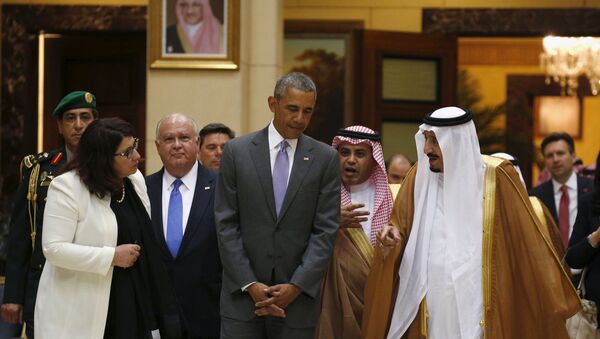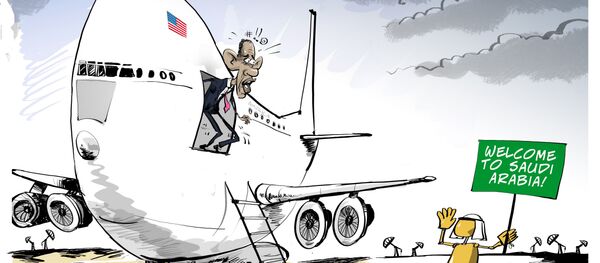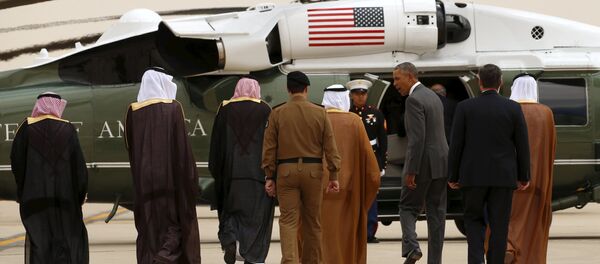On Wednesday, much of the world's media took note of the fact that Obama, arriving in Riyadh to discuss bilateral ties, was not met by King Salman at the airport, as is customary in the Kingdom, but by lower-ranking officials, including the governor of the Riyadh province.
The situation was made worse by the fact that Salman had been present at the airport earlier greeting other leaders arriving to the Gulf Cooperation Council summit, but pointedly left before Obama's arrival.
Commenting on the politics behind the diplomatic faux pas, Russian analysts say that it has significant implications for relations between the two countries, and for the situation in the region.
Speaking to Russia's Svobodnaya Pressa newspaper, Vasily Kuznetsov, the head of the Center for Arab and Islamic Studies at the Moscow-based Institute of Oriental Studies, suggested that among Arab countries in particular, issues of protocol are an important barometer of policy.
"The fact that Obama was met at the airport by a small delegation of officials, and that the media did not broadcast the details of the president's visit, indicates a serious demarche by Saudi authorities. Undoubtedly, it was not an issue of King Salman becoming unwell, or journalists accidentally forgetting to turn on their cameras," Kuznetsov noted.
"Of course," the analyst added, "this reception for Obama is evidence of the crisis in US-Saudi relations, for which there are several objective reasons. First and foremost is the Iran factor. The US understands the needs to integrate Iran into the regional system of international relations, and for a level of rapprochement. This, naturally, results in an extremely morbid reaction from Riyadh, which views Tehran as [its main] enemy."
"On the other hand, we must understand that US-Saudi relations have a rich history, deep economic and even personal connections between the elites of the two countries. So I would not say that the current cooling in relations is evidence of some global trend. It's possible that such crisis situations will recur more than once under the next president. Of course, the coming to power of a new administration in the US [next year] will give both parties an opportunity to begin a reset in relations."
"The main reason for the deterioration of relations – a glaring one from the Kingdom's view, is the nuclear deal with Iran, as a result of which Tehran will be able to build up its strength. In addition, the Saudis believe that the US has a rather passive stance on Syria. All this is forcing them to grandstand, as if to say 'guys, don't think that we are going to serve you forever – you'd do better to take our interests into consideration.'"
At the same time, Bagdasarov added, "Saudi Arabia itself cannot play on oil prices forever –it is also bearing losses, and debts for contracts are accumulating. Moreover, there are different players among the Saudi elite…The KSA is facing a serious struggle of different elite groups" internally.
In any case, the analyst suggested, "it's difficult for the US to act to satisfy everyone. In My opinion, Russia can take advantage of this. It is clear that we have very little leverage in the [Arabian peninsula], but much will depend on our actions in Syria. If Russia, with the help of Syrian forces, clears out Aleppo, closes the Syrian-Turkish border, and finally, liberates the Daesh capital of Raqqa, our influence will increase dramatically."
For his part, Stanislav Tarasov, the Director of the Middle East – Caucasus Research Center, says that it will take the next US administration at least a year-and-a-half to improve relations with the Kingdom, if it wants to do so that is.
"It's for this reason that Saudi authorities demonstrated disdain for Obama, who arrived in the Kingdom for a farewell visit. Formally, diplomatic protocol does not require the head of state to meet with his counterpart at the airport, but in the Middle East, this form of greeting is a sign of respect and, in this way, Riyadh expressed its attitude toward America as a whole."
In any case, Tarasov said, "the US election is on November 8th. If the Democrats come to power, it is unlikely that we will see any fundamental changes in foreign policy," toward the Saudis at least. "However, if the Republicans win, they will probably adhere to a different approach. However, experience shows that the new administration begins to work effectively only a year-and-a-half after coming into office."





